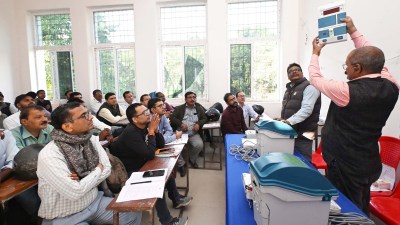Dotcom cos to shine — Management guru
CALCUTTA, MARCH 11: Management guru Sumantra Ghosal, the Robert P Bauman professor at the London Business School, is optimistic about dotc...

CALCUTTA, MARCH 11: Management guru Sumantra Ghosal, the Robert P Bauman professor at the London Business School, is optimistic about dotcom companies, pointing out that they should not be judged by the traditional parameter of correlating market capitalisation with current profitability.
Ghosal, who was here to attend the 35th annual convocation of the Indian Institute of Management Calcutta, spoke to reporters on a wide range of subjects — from managerial qualities of Indian politicians to the dearth of world-class faculty in India’s B-schools.
Ghosal, however, said his perception of the dotcom companies is not as euphoric as that of the Indian stock market. In fact he started off with three assumptions, saying: "I am teacher and I like to take hypotheses."
First, if the current craze for dotcom companies is a bubble then it will burst like all other bubbles. "This is a plausible hypothesis," Ghosal said. However, he added: "Today is the age of information and no one is isolated from it. Bubbles are generally created when there is a shortage of information and going by today’s information standards it is hard to believe that the recent surge in the dot com companies is a bubble."
Second, Ghosal said that the traditional equity market is slowly changing and adding on the features of a venture capital market. "Venture markets follow a different model from the equity market. A venture capitalist may put his money in ten projects out of which six may be total failures and three may just make up the invested money. However, in the last venture a thousand is made out of one. So this sort of a force is working at present," the professor said.
Ghosal also felt that the Indian infotech industry has created an intellectual infrastructure and the value appropriation of this industry should be calculated by the value it has created. "There is a paradox. The saying goes that the best predictor is current profitability and it is also correlated with market capitalisation. However, this should not be applied to dotcom companies. It has been witnessed in the United States in the last years, where this correlation is falling everyday," Ghosal said.
He also added that the common man is unaware of these intricacies and is interested in his real gains. "As Adam Smith said, a baker or a butcher goes to the market not to create wealth but for his gains. Similar is the situation now but the market has started appreciating companies that are creating wealth and not just profits for themselves," Ghosal said.
"I hope that out of these three hypotheses, the last one turns out to be true," he said.
IIMC launches extranet
CALCUTTA: The Indian Institute of Management at Calcutta, the oldest of the country’s IIMs, today launched its extranet, an internet based network that enables users to interact among themselves and with the outside world.
Amitava Bose, the director said that the institute would be focusing more on technology in the coming years.
The main feature of the extranet, conceived and created by the students, is its instantaneous interactive capacity. The students, faculty and the aspirants for the institution’s course can get immediate information from this website.
The institution is also considering distant education and an integration with the other IIMs. "We are hopeful that there will be an integration among the IIMs for the doctoral course and research programmes but certainly not for the MBA course. However, I do not know when it will happen," Bose said.



- 01
- 02
- 03
- 04
- 05




























